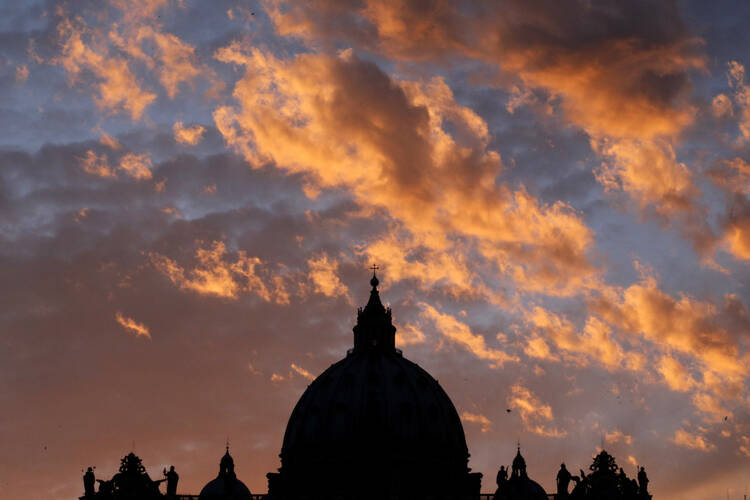An international group of Catholic sisters, priests and lay people, all of whom have been "delated" (i.e., reported) and subjected to "examination" by the Vatican’s Congregation for the Doctrine of the Faith (CDF), charge in a letter released today that the congregation “doesn’t reflect the gospel values of justice, truth, integrity and mercy that the Catholic Church professes to uphold” and that are called for by Pope Francis. They add that the CDF “acts in ways that are out of keeping with contemporary concepts of human rights, accountability and transparency that the world expects from the Christian community and which the Catholic Church demands from secular organizations.”
Letter writers urge transparency and accountability in the process, arguing that "the process should be no longer characterized by the absolutist presumptions of an antiquated legal system that has nothing to do with the Gospel," but should be "tempered by the mercy and forgiveness of God, and by the open dialogue that should characterize the community of Jesus." The group of fifteen, which includes two bishops, prominent theologians, people working in creative areas of ministry and Catholic writers and broadcasters, have written to Pope Francis and to the prefect of the CDF, Cardinal Gerhard Müller. They ask for an open discussion about the procedures of the congregation and call for approaches that, according to a statement released by the group, "respect human rights and the need for free speech, pluralism, transparency and accountability within the church community."
Among those who have signed the letter are Bishops Patrick Power and William Morris of Australia; Father Charles Curran; Sister Jeannine Gramick, S.L.; Sister Elizabeth Johnson of Fordham University, New York; Spanish Sister Teresa Forcades, O.S.B.; Irish communicators and writers Tony Flannery, CSsR and Brian D’Arcy, CP, and former Maryknoll Father Roy Bourgeois.
A spokesperson for the group, church historian Paul Collins, complained that the accused brought before the CDF have to deal with secrecy and anonymity, often having to negotiate with the CDF at third or fourth hand via a network of superiors and bishops. “People are not informed as to who accused them,” Collins says, “there is no presumption of innocence, the accused don’t know who is judging them with prosecutors acting as judges; they don’t even know who their defense counsel is. They are usually never given a chance to defend themselves verbally and in person. Letters go unanswered for months, or are 'lost.'
“Many of those investigated find the process completely draining, isolating and exhausting because it can involve excommunication and exclusion from ministry," he said. "It seems designed to wear you down psychologically. It is completely alien to the values of Christ and the Gospels.” He asks: “Can you get justice from a body that acts as investigator, accuser, judge and jury and then imposes the penalty?”
One of those recently investigated by the CDF, Tony Flannery, CSsR, says that “under the last two popes, as the church became increasingly centralised, the magisterium was understood as the Vatican, or, more specifically, the Curia, and in particular the pre-eminent body within the Curia, the Congregation for the Doctrine of the Faith. But an older understanding, which was central to the Second Vatican Council, has a more complex, wider view of what constitutes the magisterium. According to this perspective, it consists of the Vatican, the bishops of the universal church, the body of theologians, and, most significantly of all, the sensus fidelium, the good sense of the ordinary Catholic faithful. The Council goes so far as to say that unless a teaching is accepted by the consensus of the faithful it cannot be considered a defined teaching. This is the kind of theology we are trying to get through to the CDF.”
Among other reforms, the letter calls for the end of "anonymous denunciation by person(s) unknown to those being investigated." The letter-writers argue: "By naming them publicly, you stop frivolous claims by often totally unqualified individuals or organizations."
It also suggests that CDF appointed consulters "be named and their qualifications or otherwise in the area under consideration, be scrutinized," explaining, "This also gives the one being investigated a chance to know the biases and expertise/training or otherwise of each of the consulters appointed by the CDF."
According to the statement, "The whole issue of enforced secrecy and the often crippling isolation of the person being investigated must be circumvented by the CDF being made to deal directly and personally with them. They should be no longer be dealt with at third and fourth hand via a network of bishops and superiors—who might even have been the primary accuser of the person being investigated in the first place."
The process, these critics say, can seem typified by "sheer rudeness and lack of even basic politeness—let alone Christian charity."
"Letters are ignored, or lost. Processes are dragged out in an attempt to wear down the resistance of those being investigated. Even extremely sick or dying people have been investigated and forced to respond to often silly accusations." They suggest that "strict time limits and direct personal face-to-face communication would circumvent this. With supporting counsel present and the knowledge that all documentation and the names of accusers and all personnel involved will be revealed to the wider Catholic community and the media will bring about at least some measure of accountability which at the present moment is totally lacking in CDF processes."








